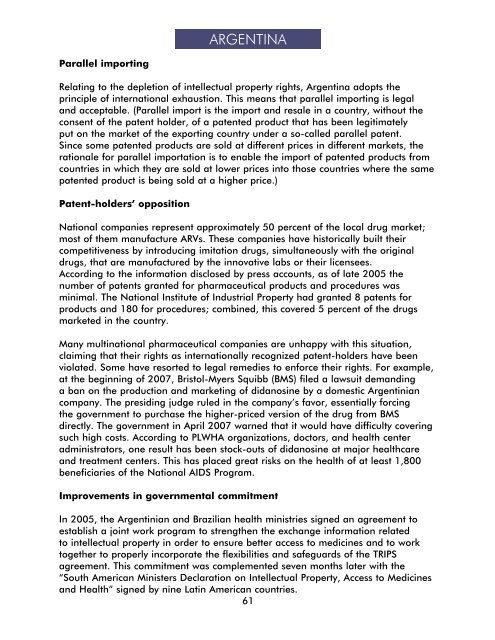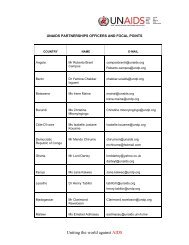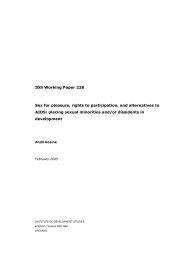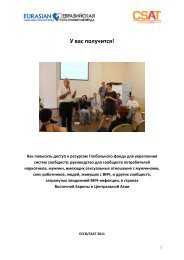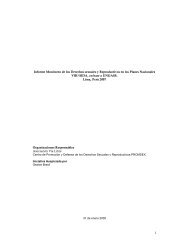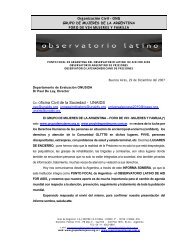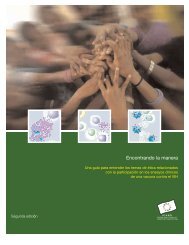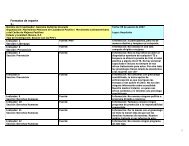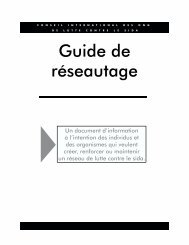Missing the Target #5: Improving AIDS Drug Access ... - CD8 T cells
Missing the Target #5: Improving AIDS Drug Access ... - CD8 T cells
Missing the Target #5: Improving AIDS Drug Access ... - CD8 T cells
You also want an ePaper? Increase the reach of your titles
YUMPU automatically turns print PDFs into web optimized ePapers that Google loves.
ARGENTINAParallel importingRelating to <strong>the</strong> depletion of intellectual property rights, Argentina adopts <strong>the</strong>principle of international exhaustion. This means that parallel importing is legaland acceptable. (Parallel import is <strong>the</strong> import and resale in a country, without <strong>the</strong>consent of <strong>the</strong> patent holder, of a patented product that has been legitimatelyput on <strong>the</strong> market of <strong>the</strong> exporting country under a so-called parallel patent.Since some patented products are sold at different prices in different markets, <strong>the</strong>rationale for parallel importation is to enable <strong>the</strong> import of patented products fromcountries in which <strong>the</strong>y are sold at lower prices into those countries where <strong>the</strong> samepatented product is being sold at a higher price.)Patent-holders’ oppositionNational companies represent approximately 50 percent of <strong>the</strong> local drug market;most of <strong>the</strong>m manufacture ARVs. These companies have historically built <strong>the</strong>ircompetitiveness by introducing imitation drugs, simultaneously with <strong>the</strong> originaldrugs, that are manufactured by <strong>the</strong> innovative labs or <strong>the</strong>ir licensees.According to <strong>the</strong> information disclosed by press accounts, as of late 2005 <strong>the</strong>number of patents granted for pharmaceutical products and procedures wasminimal. The National Institute of Industrial Property had granted 8 patents forproducts and 180 for procedures; combined, this covered 5 percent of <strong>the</strong> drugsmarketed in <strong>the</strong> country.Many multinational pharmaceutical companies are unhappy with this situation,claiming that <strong>the</strong>ir rights as internationally recognized patent-holders have beenviolated. Some have resorted to legal remedies to enforce <strong>the</strong>ir rights. For example,at <strong>the</strong> beginning of 2007, Bristol-Myers Squibb (BMS) filed a lawsuit demandinga ban on <strong>the</strong> production and marketing of didanosine by a domestic Argentiniancompany. The presiding judge ruled in <strong>the</strong> company’s favor, essentially forcing<strong>the</strong> government to purchase <strong>the</strong> higher-priced version of <strong>the</strong> drug from BMSdirectly. The government in April 2007 warned that it would have difficulty coveringsuch high costs. According to PLWHA organizations, doctors, and health centeradministrators, one result has been stock-outs of didanosine at major healthcareand treatment centers. This has placed great risks on <strong>the</strong> health of at least 1,800beneficiaries of <strong>the</strong> National <strong>AIDS</strong> Program.Improvements in governmental commitmentIn 2005, <strong>the</strong> Argentinian and Brazilian health ministries signed an agreement toestablish a joint work program to streng<strong>the</strong>n <strong>the</strong> exchange information relatedto intellectual property in order to ensure better access to medicines and to worktoge<strong>the</strong>r to properly incorporate <strong>the</strong> flexibilities and safeguards of <strong>the</strong> TRIPSagreement. This commitment was complemented seven months later with <strong>the</strong>“South American Ministers Declaration on Intellectual Property, <strong>Access</strong> to Medicinesand Health” signed by nine Latin American countries.61


